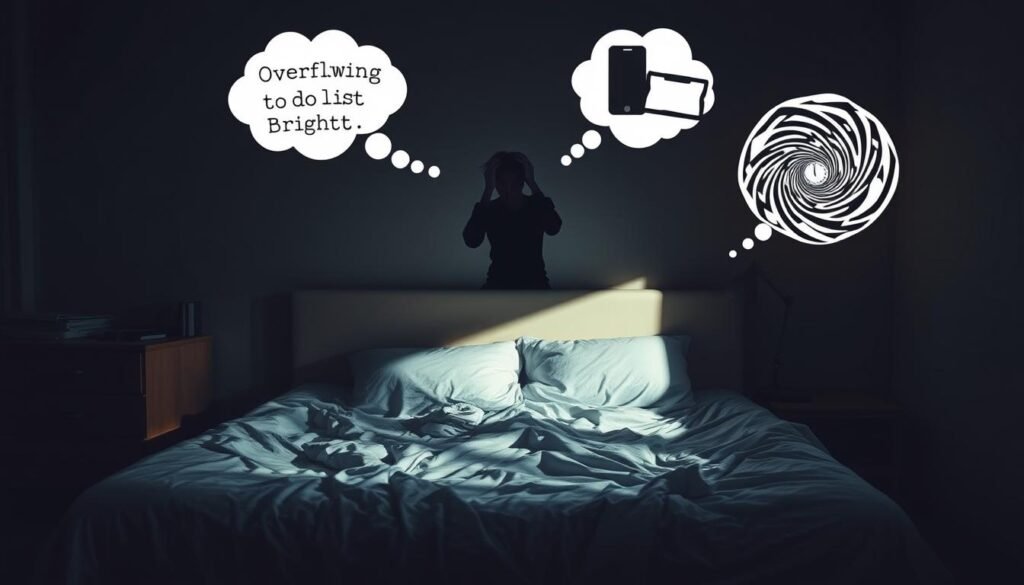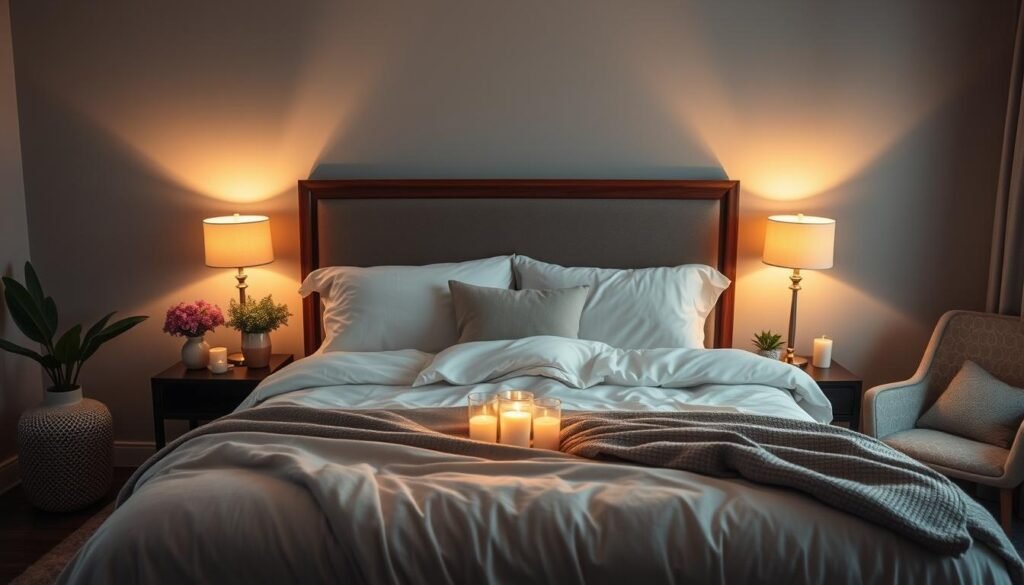A 2020 study reveals a shocking fact: nearly one-third of people start facing new insomnia annually. This condition suddenly makes it hard to fall or stay asleep. It can affect your day with tiredness, mood swings, and mental strain. Knowing the causes of insomnia is key. They can be mental or due to your surroundings. For those struggling to sleep, it’s vital to find and use solutions.
Key Takeaways
- Sudden insomnia affects a significant portion of the population.
- Multiple factors contribute to insomnia, including stress and environmental influences.
- Chronic sleep deprivation can lead to severe mental and physical health issues.
- Identifying symptoms of sleep difficulties is crucial for seeking help.
- Developing healthy sleep habits and creating a comfortable environment can offer relief.
- Medical treatments and natural remedies can help manage sudden insomnia.
Understanding Sudden Insomnia
Sudden insomnia suddenly disturbs your normal sleep. It affects about 30 percent of people each year. If not handled, it can turn into chronic insomnia, lasting more than three weeks.
Changes in life, stress, and certain health issues can cause this sleep problem. Worrying too much about not sleeping can also make it worse. People with sudden insomnia might feel sad or very moody. Finding a good way to sleep better is very important.
Older folks and those going through menopause are more likely to have sleep troubles. Conditions like restless leg syndrome or sleep apnea can make insomnia worse. It’s important to know what causes your sleep issues to fix them.
Making changes in your daily life can improve your sleep. Looking at advice from sleep experts can help a lot. For tips on how to beat insomnia, check out this site.
Common Causes of Sudden Insomnia
Understanding the causes of sudden insomnia is key to tackling this common problem. It comes from psychological, environmental, and physical factors. These elements play a big role in sleep issues.
Psychological Factors
Anxiety, stress, and emotional trouble can keep you awake. They make you too alert to sleep well. Depression or psychological issues may make it worse. Dealing with these can help improve your sleep and well-being.
Environmental Influences
Things around us can interrupt our sleep. This includes noise, poor lighting, or being too hot or cold. Changes like moving or construction near your home can also make it hard to sleep. A comfortable and quiet sleep space can lessen these disruptions.
Physiological Conditions
Many sudden insomnia cases come from physical issues. Conditions like sleep apnea, restless legs syndrome, or chronic pain impact sleep. Hormones can also play a part, especially during menopause or with thyroid problems. Knowing these can help find ways to better sleep.
The Impact of Sleep Deprivation
Sleep deprivation severely impacts mental and physical health. Research shows that not getting enough sleep affects our well-being deeply. It’s important to treat sleep disorders.
Mental Health Consequences
Lack of sleep can make us feel anxious, irritable, and unable to focus. People who don’t sleep well often feel more stressed, leading to even worse sleep. This can increase the risk of depression. Adequate sleep is vital for emotional stability.
Physical Health Risks
Sleep deprivation can lead to serious health risks. We’re more likely to develop conditions like high blood pressure, high cholesterol, and diabetes. It also raises our risk for heart disease.
Not sleeping enough can make us more likely to get sick. It also increases our chances of becoming obese. Sleep issues are a major public health concern, affecting millions.
| Health Impact | Details |
|---|---|
| Increased Anxiety | Higher levels of stress and irritability |
| Mood Disorders | Increased risk of depression |
| Cardiovascular Issues | Heightened risk of heart attack and stroke |
| Metabolic Disorders | Greater susceptibility to Type 2 diabetes and obesity |
| Immune Function | Weakened defenses against infections |
| Pain Sensitivity | Increased pain sensitivity leading to chronic pain issues |
It’s key to address sleep deprivation to protect our mental and physical health. The wide-reaching effects of sleep disorders underscore the need for better sleep solutions.
Identifying Signs of Sleep Difficulties
It’s key to spot sudden insomnia signs early. Insomnia hints at possible deeper problems. Especially if these issues don’t go away. Knowing these signs helps tell when it’s time for expert advice.
Symptoms of Sudden Insomnia
Those with sleep troubles often see clear signs that mess with their sleep. Common issues include:
- Difficulty falling asleep
- Frequent awakenings during the night
- Daytime fatigue or excessive sleepiness
- Changes in sleep patterns, notably increased nightmares
- Reduced dreaming or an inability to recall dreams
About one-third of adults report insomnia signs. 4-22% actually meet the criteria for insomnia disorder. Catching these signs early is key to successful treatment.

| Symptom | Impact on Daily Life | Potential Solution |
|---|---|---|
| Difficulty falling asleep | Increased fatigue and irritability | Cognitive-behavioral therapy |
| Frequent awakenings | Reduced productivity and focus | Sleep hygiene improvements |
| Extreme fatigue | Increased risk of accidents | Possible medical evaluation |
| Increased nightmares | Heightened anxiety and distress | Therapy and relaxation techniques |
| Reduced dreaming | Loss of creativity and emotional processing | Mindfulness and meditation |
How Long Does Sudden Insomnia Typically Last?
How long sudden insomnia lasts can be different for everyone. Some people might only have it for one night, while others might struggle for weeks. About one-third of adults will go through this, often because of stress or big changes in their life. Interestingly, each year, up to 25% of Americans experience acute insomnia. But, most of them get better without it turning into a long-term problem.
Chronic insomnia sticks around longer. It means having trouble sleeping for more than three nights a week, for more than three months. Around 10% of people have this kind of insomnia. It can really affect their daily life. Long-lasting insomnia often comes from health issues, mental health struggles, or the way someone lives their life.
Knowing how long sleep issues usually last can help people figure out if they need to do something about it. If insomnia goes away in a few weeks, it’s likely acute. Treatments like cognitive behavioral therapy work well for many. Up to 80% of people find they get over their insomnia completely with this approach.
| Type of Insomnia | Duration | Prevalence |
|---|---|---|
| Acute Insomnia | 1 night to several weeks | 25% of Americans annually |
| Chronic Insomnia | 3 nights a week for 3 months or longer | 10% of adults |
| Insomnia Overall | Varies widely | Approximately 30% of the global population |
Solutions for Sudden Insomnia
To find good insomnia solutions, making your sleep area better and building good habits are key. A few simple changes can really help you sleep better and beat sudden insomnia. Tweaking your bedroom and habits can lead to deeper sleep.
Creating a Comfortable Sleep Environment
For a comfy comfortable sleep environment, it’s important to make your bedroom just right for sleeping. Dark rooms help a lot, so blackout curtains are a great idea. Also, keeping it quiet helps you relax more easily. The stuff you sleep on matters too. Choosing the right pillows and mattresses can stop you from feeling uncomfortable at night.
- Control room temperature for optimal comfort.
- Incorporate calming scents, like lavender, through aromatherapy.
- Choose sensory-friendly materials for bedding to enhance comfort.
These tips can make your room a calm place that lets you fall asleep easier. This can quickly help those dealing with insomnia.

Developing Healthy Sleep Hygiene
Good sleep hygiene is key to fighting off insomnia. Going to bed and waking up at the same time every day helps your body know when to sleep. Staying away from caffeine and nicotine before bed is important because they can keep you awake. Cutting down on screen time is also helpful because blue light messes with your sleep hormones.
For better healthy sleep habits, consider:
- Working out during the day to make you tired by bedtime.
- Avoiding heavy meals before bed so you’re not uncomfortable.
- Having a relaxing routine at night to tell your body it’s time to sleep.
Doing these things can improve your sleep quality and overall health. If sleep problems keep happening, it’s a good idea to look at expert advice for solutions.
Medical Treatments for Insomnia Relief
Various medical treatments can help relieve insomnia. Options include prescription medications and over-the-counter sleep aids. They address different levels of sleep issues and individual needs.
Prescription Options
For chronic insomnia, prescription medications may be necessary. It’s important to talk with healthcare providers to find the right insomnia treatments. Various sleep medications are available, including:
- Benzodiazepines: These are FDA-approved for treating insomnia. They are Schedule IV controlled substances. They aim to improve sleep quality.
- Z drugs: These offer an alternative to benzodiazepines. They help with falling asleep or staying asleep.
- Ramelteon: This drug helps with falling asleep. It works by mimicking melatonin.
- Suvorexant: Suitable for falling and staying asleep. It is also a Schedule IV controlled substance.
With few qualified behavioral sleep medicine therapists, exploring prescription options is crucial. Nearly 10% to 30% of adults experience insomnia. Understanding these options can improve management of the condition. More information on insomnia symptoms can be found here.
Over-the-Counter Sleep Aids
Over-the-counter sleep aids are helpful for mild to moderate sleep problems. About 25% of patients use OTC sleep aids for temporary relief. Popular choices include:
- Antihistamines: These can induce sleep with their sedative properties.
- Melatonin Supplements: They help regulate sleep cycles.
While these nonprescription treatments benefit occasional insomnia, they may have side effects. Knowing when they are appropriate is key. About 2% to 6% of adults use sleep medications regularly. Making informed decisions is essential.
| Treatment Type | Examples | Classification | Primary Use |
|---|---|---|---|
| Prescription Medications | Benzodiazepines, Z drugs, Ramelteon, Suvorexant | Schedule IV | Chronic Insomnia |
| Over-the-Counter Sleep Aids | Antihistamines, Melatonin | Non-controlled | Mild Insomnia |
Natural Remedies for Sudden Insomnia
Many people find great value in natural remedies for sudden insomnia. These options can be a good alternative to medicine. Herbal supplements and relaxation methods are great for better sleep.
Herbal Supplements and Relaxation Techniques
There are many herbal supplements to help with sleep issues. Valerian root and chamomile are known for their soothing effects. Valerian is often used in doses of 400 to 900 mg before bed. Chamomile extract helps older adults with insomnia too.
Adding relaxation practices to your nightly routine can improve your sleep. Mindfulness meditation and Progressive Muscle Relaxation (PMR) help reduce insomnia. A study found that meditation made sleep patterns better. Deep breathing and gentle yoga help calm the mind, making it easier to sleep.
Trying these natural solutions can help you deal with sleep problems. They promote rest and relaxation without using drugs.

Routine Changes to Combat Sleeplessness
Having a consistent sleep routine is key to fighting sleeplessness. It helps align the body’s internal clock. This improves how well and how long you sleep. Nearly 43% of Americans struggle to get good sleep. This shows how key a daily routine is.
Establishing a Regular Sleep Schedule
Sticking to the same bedtime and wake-up time even on weekends is important. This habit supports the body’s sleep-wake cycle. People enjoy many benefits from this habit:
- Improved Sleep Quality: A set sleep pattern leads to better rest.
- Increased Daytime Alertness: Regular sleep reduces tiredness and improves focus during the day.
- Enhanced Mood: Stable routines lessen anxiety and depression linked to poor sleep.
Alongside keeping a regular sleep time, some actions can also improve sleep:
- Avoid Caffeine: Don’t have caffeine late in the day to avoid sleep problems.
- Reduce Evening Light Exposure: Less bright light before bed helps your body get ready to sleep.
- Implement a Relaxing Routine: Have calming activities before bed to relax your mind and body.
- Limit Daytime Naps: Nap less in the day for better sleep at night.
Fighting sleeplessness means more than just a regular bedtime. It’s about healthy habits for long-term sleep quality.
| Behavior Change | Potential Benefit |
|---|---|
| Consistent Sleep Schedule | Aligns internal clock |
| Avoiding Caffeine | Reduces disrupted sleep |
| Relaxing Bedtime Routine | Promotes calming transitions |
| Limiting Naps | Enhances nighttime wakefulness |
Changing routines is crucial for good sleep and tackling insomnia challenges.
Conclusion
Sudden insomnia is important to notice. It may show bigger health issues. Knowing why insomnia happens helps people find out their own sleep problems. It’s key to get doctor’s advice if sleep troubles don’t go away. This is because long-term insomnia affects about 10% to 15% of folks. It’s often tied to mental health problems and lower life quality.
Beating insomnia takes different methods. Using medical and natural ways helps people sleep better. For example, cognitive behavioral therapy for insomnia (CBT-I) is a top method for ongoing sleep issues. Making life changes, like good sleep habits and a cozy sleep space, also boosts sleep and stops future problems.
Don’t ignore sudden insomnia, as many have faced it at some point. Finding the right solutions, including behavior treatments, can make sleep better. To learn more about insomnia, check out research on the subject.